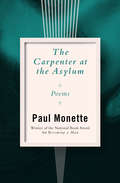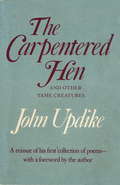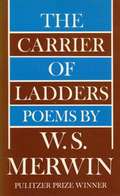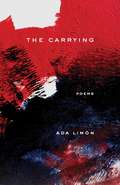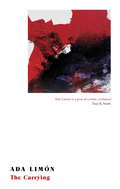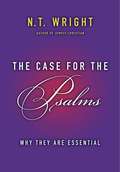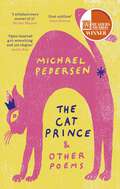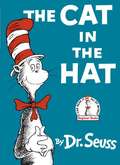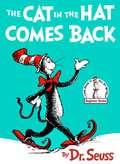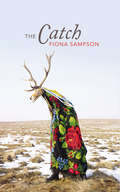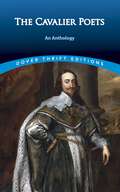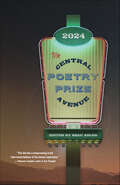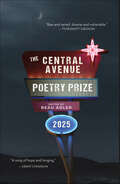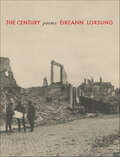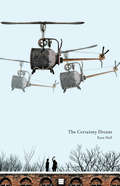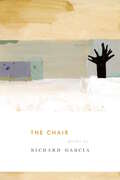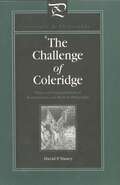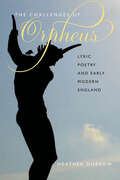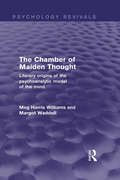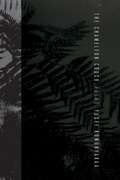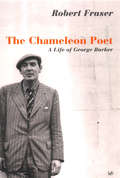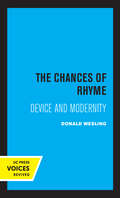- Table View
- List View
The Carpenter at the Asylum: Poems
by Paul MonetteNational Book Award winner Paul Monette&’s acclaimed first book of poetryOriginally published in 1975, The Carpenter at the Asylum was Monette&’s first literary success. In this collection of poems, he writes with playfulness and candor of everything from fairy tales to the change of seasons. &“All things glitter like fresh milk,&” he writes in one poem. And indeed, these works pull a sparklingly strange beauty from everyday objects and experiences.This ebook features an illustrated biography of Paul Monette including rare images and never-before-seen documents from the Paul Monette papers of the UCLA Library Special Collections.
The Carpentered Hen
by John UpdikeAs a present to John Updike on his fiftieth birthday, and as a treat for his readers, his first book, a collection of light verse originally published twenty-five years ago, is brought back into print, with an author's foreword and some small revisions. Many of these poems were written when the author was a young art student in England and a "Talk of the Town" reporter for The New Yorker, which published over forty of them. They deal with the quiddities of things, the oddities of science, quirks of American life (especially as reported in Life magazine during those smiling Eisenhower years), and moments of epiphany in literature and nature. A number--"Ex-Basketball Player," "Superman," "Mirror," "Quilt"--have been frequently reprinted in anthologies. All show a sharp ear, a fond eye, and an active though not always light-hearted fancy. Written mainly to amuse, Updike's early verse was also, as his foreword states, "a way of dealing with the universe, an exercise of the Word." Admirers who know him mostly through his fiction should be delighted to encounter what he calls "these old evidences of my own high spirits." The Carpentered Hen, in recent years a hard-to-get collector's item, now again. unhinges her wings,abandons her nestof splinter, and sings.
The Carrier of Ladders
by W. S. MerwinPulitzer Prize for Poetry 1971. Merwin has since won a National Book Award for his selected poems and the 2009 Pulitzer for the Shadow of Sirius.
The Carrying: Poems
by Ada Limón<p>Vulnerable, tender, acute, these are serious poems, brave poems, exploring with honesty the ambiguous moment between the rapture of youth and the grace of acceptance. A daughter tends to aging parents. A woman struggles with infertility―“What if, instead of carrying / a child, I am supposed to carry grief?”―and a body seized by pain and vertigo as well as ecstasy. A nation convulses: “Every song of this country / has an unsung third stanza, something brutal.” And still Limón shows us, as ever, the persistence of hunger, love, and joy, the dizzying fullness of our too-short lives. “Fine then, / I’ll take it,” she writes. “I’ll take it all.” <p>In Bright Dead Things, Limón showed us a heart “giant with power, heavy with blood”―“the huge beating genius machine / that thinks, no, it knows, / it’s going to come in first.” In her follow-up collection, that heart is on full display―even as The Carrying continues further and deeper into the bloodstream, following the hard-won truth of what it means to live in an imperfect world.</p>
The Carrying: Winner of the National Book Critics Circle Award for Poetry
by Ada LimónWINNER OF THE NATIONAL BOOK CRITICS CIRCLE AWARD FOR POETRY 2019Ada Limón is a poet of ecstatic revelation . . . a book of deep wisdom and urgent vulnerability' Tracy K. Smith, Guardian'Vulnerable, tender, acute . . . The Carrying is a gift' Natasha Trethewey, Pulitzer Prize-winning poet and former US Poet Laureate'Exquisite poems' Roxane GayFrom National Book Critics Circle Award Winner Ada Limón comes The Carrying - her most powerful collection yet.Vulnerable, tender, acute, these are serious poems, brave poems, exploring with honesty the ambiguous moment between the rapture of youth and the grace of acceptance. A daughter tends to aging parents. A woman struggles with infertility - 'What if, instead of carrying / a child, I am supposed to carry grief?' - and a body seized by pain and vertigo as well as ecstasy. A nation convulses: 'Every song of this country / has an unsung third stanza, something brutal.' And still Limón shows us, as ever, the persistence of hunger, love, and joy, the dizzying fullness of our too-short lives. 'Fine then, / I'll take it,' she writes. 'I'll take it all.'The Carrying leads us deeper towards the hard-won truth of what it means to live in an imperfect world.
The Case For The Psalms: Why They Are Essential
by N. T. WrightOne of the world's most trusted Bible scholars, N. T. Wright turns his attention to the central collection of prayers that Jesus and Paul knew best: the book of Psalms. Wright points out that the Psalms have served as the central prayer and hymnbook for the church since its beginning--until now. In The Case for the Psalms, Wright calls us to return to the Psalms as a steady, vital component of healthy Christian living. Reading, studying, and praying the Psalms is God's means for teaching us what it means to be human: how to express our emotions and yearnings, how to reconcile our anger and our compassion, how to see our story in light of God's sweeping narrative of salvation. Wright provides the tools for understanding and incorporating these crucial verses into our own lives. His conclusion is simple: all Christians need to read, pray, sing, and live the Psalms.
The Cat Is My Grief Today and Other Poems
by P. P. Raveendran Kadammanitta RamakrishnanLife and works (including poems) of Malayalam novelist K. Ramakrishnan. Selected, and translated into English from Malayalam, by P.P. Raveendran.
The Cat Prince: & Other Poems
by Michael Pedersen'Pedersen bends words like no-one else. There's a naughtiness, an innocence and surprising vulnerability in this collection. It's poetry to intoxicate. Just sublime.' Juno Dawson 'Every page of The Cat Prince brought me gladsome joy. Pedersen has the astonishing power of finding the astonishing in every moment that deserves a raised glass' Daljit Nagra'This laser focused collection of poetry by Michael Pedersen will gut you like a fish and smash your heart in. Searingly specific, exquisite and requisite. I relished reading every tiny morsel of it' Shirley Manson'Open-hearted, gut-wrenching and yet elegiac, these poems pack a hefty emotional punch. Michael Pederson's poems display a huge vocabulary for love, love in all its many forms and guises. These poems chart the journey from boyhood to manhood, the highs and the lows, the losses and the gains, always working their way towards an essential, emotional truth' Jackie Kay'If the alphabet is a piano keyboard then Michael Pedersen plays it with the confidence and panache of a jazz improviser who knows that every note can have the potential to change someone's life. Be amazed by this book' Ian McMillan'Michael's poems are so physical you can almost touch the images in them. Fabulously sensual and alive. I adore poetry like this' Stephen FryThe Cat Prince & Other Poems is the third collection from prize-winning poet, and author of Boy Friends, Michael Pedersen. All moggy moxie, Pedersen croons to the beauty and devastation of love, loss, friendship, cats and careless joy. Equal parts tender and trenchant, raw and ribald, plangent and smutty, these poems exhibit an emotionally charged, fantastical playground of language and lore. From the brutalising death of a cherished friend comes a gut-wrenching grief. And so begins a tenacious quest for light, lustre and survival as Pedersen pays tender tribute to a gorgeous, life-altering friendship. In doing so, he harks back to the hilarity of being young, reckless and petrified: memories of boys showboating in a fishing tackle shop, games of feline metamorphosis, laments for demolished buildings and a case of constipation of the most pernicious stock.As frisky as it is fierce, The Cat Prince pounces around the poet's emotional and physical landscapes, past and present, unfankling a Scotland full of gothic splendour and nature's majesty.These poems reveal a poet at his bravest and most vulnerable. The Cat Prince & Other Poems purrs with affection, flashes its teeth, then digs in the claws.
The Cat in the Hat
by Dr SeussRainy days are no fun. But the Cat in the Hat shows up with games and tricks that are bound for trouble!
The Cat in the Hat
by SeussPoor Dick and Sally. It's cold and wet and they're stuck in the house with nothing to do . . . until a giant cat in a hat shows up, transforming the dull day into a madcap adventure and almost wrecking the place in the process! Written by Dr. Seuss in 1957 in response to the concern that "pallid primers [with] abnormally courteous, unnaturally clean boys and girls' were leading to growing illiteracy among children, The Cat in the Hat (the first Random House Beginner Book) changed the way our children learn how to read.
The Cat in the Hat Comes Back!
by Dr SeussFor very young readers, this sequel to The Cat in the Hat has the Cat relying on other Cats to help him clean.
The Catch
by Fiona SampsonFiona Sampson’s latest collection transforms the sensory world into an astonishingly new and vivid poetry. Here, dream and myth, creatures real and imagined, and the sights and sounds of ‘distance and of home’ all coalesce in a sustained meditation on time and belonging. Combining formal sophistication with metaphysical exploration, this is an incandescent work of renewal, beauty and risk.
The Cavalier Poets: An Anthology (Dover Thrift Editions: Poetry)
by Thomas CroftsIn the mid-seventeenth century, the poets associated with the court of Charles I of England, known as the Cavaliers, were strongly influenced by the classicism of Ben Jonson. Their verse, often concerned with the vagaries of love, is characteristically charming, witty, graceful, and elegant. This volume contains a rich sampling of more than 120 works by four Cavalier poets: Robert Herrick, Thomas Carew, Sir John Suckling, and Richard Lovelace.Included are such well-known gems as Herrick's "To the Virgins to Make Much of Time," ("Gather ye rosebuds while ye may"), Carew's "A Cruel Mistress," Suckling's "Why so pale and wan, fond lover?" and many more. Gathered in this inexpensive volume, this garland of memorable verse will delight any student of English literature or lover of fine poetry.
The Central Avenue Poetry Prize 2024 (The Central Avenue Poetry Prize #1)
by Beau AdlerA collaborative effort between poets from all corners of the world and all walks of life, The Central Avenue Poetry Prize presents a collection of poetry like no other. Rife with heartache, longing, laughter, and life, this book captures the spark of creativity and the vastness that is the human soul within its pages. This collection contains stories that are funny, some that are sad, some that are beautifulóand all that are true. Diverse in content and rich in talent, this is a testament to the art of poetry, and a reminder that the act of writing comes from the act of living, and when we create, we allow ourselves to see and be seen.
The Central Avenue Poetry Prize 2025 (The Central Avenue Poetry Prize)
by Beau AdlerThis second volume of The Central Avenue Poetry Prize offers a collection of depth and breadth from poets worldwide and of various backgrounds. Readers will find a tapestry of emotionsóheartache, longing, laughter, and the essence of life itselfóeach poem capturing human creativity and experience. From anecdotes to reflections, from tales of beauty to moments of raw truth, this collection serves as both a tribute to the art form and a poignant reminder that writing is an extension of livingóan act of expression that allows us to reveal ourselves and connect with others.
The Century: Poems
by Éireann LorsungA meticulously detailed catalogue of ordinary people performing acts of extraordinary violence, The Century charts an awakening to structures of dominance and violence. In the tradition of witness poetry, The Century tugs apart the quotidian horrors required to perpetuate acts of violence like the Holocaust, the deployment of nuclear weapons in Japan and Iraq, American slavery and its lingering aftermath. When Éireann Lorsung writes of death and dying, of &“bodies in the fields becoming the fields,&” it&’s the simplicity that&’s most haunting. After a fire, &“some of their skin moved off of them as they ran, a very / simple melting…&” But these poems don&’t just witness; they also resist and serve as models for resistant lives. Pushing back against form and grammar, constructions of time and geography, Lorsung traces decades of technological, geopolitical, and cultural shifts through generations and across continents as networks of dominance continue to be stubbornly upheld.The Century is evasive but thorny, splintering in the mind. This collection is a reminder that the arrival of each new century, decade, or year brings with it an invitation to join ongoing movements of resistance, air pockets of hope in the waters that we all swim or drown in.
The Certainty Dream
by Kate HallShortlisted for the 2010 Griffin Poetry Prize. Descartes asked, How can I know that I am not now dreaming? The Certainty Dream poses similar questions through poetry, but without the trappings of traditional philosophy. Kate Hall's bracingly immediate, insistently idiosyncratic debut collection lays bare the tricks and tools of her trade: a mynah bird perches in poems but 'stands for nightingale'; the poet's antelope turns transparent; she dresses up her orange trees with bark and leaves. As the dream world and the waking world blur, the body and the dimensions it inhabits become a series of overlapping circles, all acting as containers for both knowledge and uncertainty. At times disarmingly plainspoken, at others, singing with lyric possibility, these poems make huge associative leaps. Taken together, they present the argument that to truly 'know' something, one must first recognize its traces in something else.
The Chair
by Richard GarciaOne of America's foremost prose poets, Richard Garcia's The Chair simultaneously takes place in the natural world and a speculative world rich in the fabulist tradition: historical figures roam like ghosts, time is pulled and twisted, and narrative spins effortlessly out of language. A core of autobiography grounds these poems that are rife with surprises uniting the mythic and the everyday.Richard Garcia's awards include an NEA, a Pushcart Prize, and the American Poetry Journal Book Prize. He teaches creative writing in the Antioch University Los Angeles Low-Residency MFA program and lives on James Island, South Carolina.
The Challenge of Coleridge: Ethics and Interpretation in Romanticism and Modern Philosophy (Literature and Philosophy)
by David HaneyInterweaving past and present texts, The Challenge of Coleridge engages the British Romantic poet, critic, and philosopher Samuel Taylor Coleridge in a "conversation" (in Hans-Georg Gadamer’s sense) with philosophical thinkers today who share his interest in the relationship of interpretation to ethics and whose ideas can be both illuminated and challenged by Coleridge’s insights into and struggles with this relationship.In his philosophy, poetry, theology, and personal life, Coleridge revealed his concern with this issue, as it manifests itself in the relation between technical and ethical discourse, between fact and value, between self and other, and in the ethical function of aesthetic experience and the role of love in interpretation and ethical action.Relying on Gadamer’s hermeneutics to supply a framework for his approach, Haney connects Coleridge’s ideas with, among others, Emmanuel Levinas’s other-oriented notion of ethical subjectivity, Paul Ricoeur’s view about the other’s implication in the self, reinterpretations of Greek drama by Bernard Williams and Martha Nussbaum, and Gianni Vattimo's post-Nietzschean hermeneutics.Coleridge is treated not as a product of Romantic ideology to be deconstructed from a modern perspective, but as a writer who offers a "challenge" to our modern tendency to compartmentalize interpretive issues as a concern for literary theorists and ethical issues as a concern for philosophers. Looking at the two together, Haney shows through his reading of Coleridge, can enrich our understanding of both.
The Challenges of Orpheus: Lyric Poetry and Early Modern England
by Heather DubrowThis critical exploration of how we define lyric poetry is “thorough, penetrating, and on the cutting edge of contemporary scholarship” (Choice).As a literary mode “lyric” is difficult to define. The term is conventionally applied to brief, songlike poems expressing the speaker’s interior thoughts, but many critics have questioned the underlying assumptions of this definition. While many people associate lyric with the Romantic era, Heather Dubrow turns instead to the poetry of early modern England. The Challenges of Orpheus confronts widespread assumptions about lyric, exploring such topics as its relationship to its audiences, the impact of material conditions of production and other cultural pressures, lyric’s negotiations of gender, and the interactions and tensions between lyric and narrative.Dubrow offers fresh perspectives on major texts of the period—from Sir Thomas Wyatt’s “My lute awake” to John Milton’s Nativity Ode—as well as poems by lesser-known figures. She also extends her critical conclusions to poetry in other historical periods and to the relationship between creative writers and critics, recommending new directions for the study of lyric and of genre.A Choice Magazine Outstanding Academic Title
The Chamber of Maiden Thought: Literary Origins of the Psychoanalytic Model of the Mind (Psychology Revivals)
by Margot Waddell Meg Harris WilliamsLiterature is recognised as having significantly influenced the development of modern psychoanalytic thought. In recent years psychoanalysis has drawn increasingly on the literary and artistic traditions of western culture and moved away from its original medical–scientific context. Originally published in 1991 The Chamber of Maiden Thought (Keats's metaphor for 'the awakening of the thinking principle') is an original and revealing exploration of the seminal role of literature in forming the modern psychoanalytic model of the mind.The crux of the 'post-Kleinian' psychoanalytic view of personality development lies in the internal relations between the self and the mind's 'objects'. Meg Harris Williams and Margot Waddell show that these relations have their origins in the drama of identifications which we can see played out metaphorically and figuratively in literature, which presents the self-creative process in aesthetic terms. They argue that psychoanalysis is a true child of literature rather than merely the interpreter or explainer of literature, illustrating this with some examples from clinical experience, but drawing above all on close scrutiny of the dynamic mental processes presented in the work of Shakespeare, Milton, the Romantic poets, Emily Bronte and George Eliot.The Chamber of Maiden Thought will encourage psychoanalytic workers to respond to the influence of literature in exploring symbolic mental processes. By bringing psychoanalysis into creative conjunction with the arts, it enables practitioners to tap a cultural potential whose insights into the human mind are of immense value.
The Chameleon Couch: Poems
by Yusef KomunyakaaBeginning with "Canticle," this varied new collection often returns to the idea of poem as hymn, ethereal and haunting, as Komunyakaa reveals glimpses of memory, myth, and violence. With contemplations that spring up along walks or memories conjured by the rhythms of New York, Komunyakaa pays tribute more than ever before to those who came before him.
The Chameleon Poet: A Life of George Barker
by Robert FraserThe poet George Barker was convinced that his biography could never be written. 'I've stirred the facts around too much,' he told Robert Fraser. 'It simply can't be done.' Eliot wrote of his 'genius'. Yeats thought him the most interesting poet of his generation. Dylan Thomas envied his power over women. War trapped him in Japan. In America he conducted one of the most celebrated love affairs of the century. He fathered fifteen children in several countries, three during one battle-torn summer. By the 1950s he was the toast of Soho. Barker was Catholic and bohemian, frank and elusive, tender and boisterous. In Eliot's phrase, he was 'a most peculiar fellow.' Robert Fraser's biography offers both a portrait of a talented, tormented and irresistibly entertaining man, and a broad cultural landscape. Around the central figure cluster painters like Francis Bacon, Lucian Freud, Johnny Minton and the 'Roberts' Colquhoun and MacBryde; writers such as Dylan Thomas, Walter de la Mare and Elizabeth Smart, whose By Grand Central Station I Sat Down and Wept hymns their liaison; the lugubrious humorist Jeffrey Bernard. After closing time at the Colony Room, Minton declared, they had to sweep up the jokes.
The Chances of Rhyme: Device and Modernity
by Donald WeslingThis title is part of UC Press's Voices Revived program, which commemorates University of California Press’s mission to seek out and cultivate the brightest minds and give them voice, reach, and impact. Drawing on a backlist dating to 1893, Voices Revived makes high-quality, peer-reviewed scholarship accessible once again using print-on-demand technology. This title was originally published in 1980.
